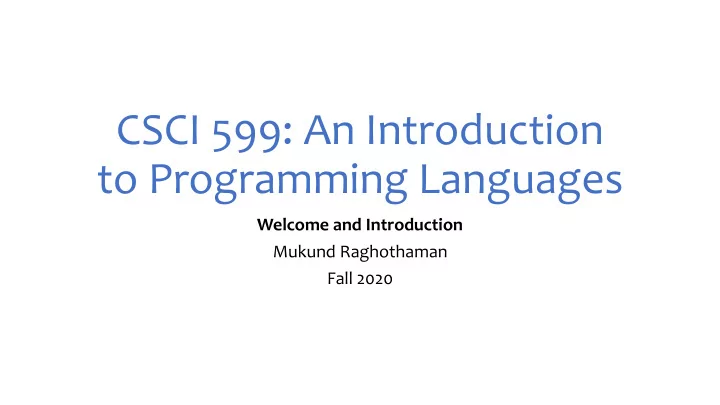

CSCI 599: An Introduction to Programming Languages Welcome and Introduction Mukund Raghothaman Fall 2020
Programming Languages • System of communication used by a country or community 2
Programming Languages • Notation for specifying a computation 3
Why Study Programming Languages? • Programming is not hard • Programming well is very hard • Linguistic relativity : Structure of a language affects its speaker’s worldview (Controversial) https://www.wnycstudios.org/podcasts/radiolab/segments/211213-sky-isnt-blue • Programming languages shape programming thought (Dogma for the purposes of this course) 4
Our Goals in this Course • Make you better programmers … • … by exposing you to powerful new languages and programming constructs • Demystify some of the magic • Make you informed leaders who can influence technical decisions • Change the way you think about computation 5
Course Outline • 3 units, ~4 — 5 weeks each • Functional programming in Ocaml • Relational programming: Spreadsheets, SQL and logic programs • Implementation details: Syntax, type systems, runtime (tail call optimization and garbage collection), unification and evaluation algorithms 6
History of Programming Languages John McCarthy John Backus 1927 — 2011 1924 — 2007 Turing Award 1971 Turing Award 1977 Robin Milner 1934 — 2010 OCaml Turing Award 1991 [Pascal Rigaux] 7
Why Functional Programming? • Encourage immutability Programs are easier to think about • Algebraic data types and pattern matching Elegant ways to construct and destruct data • First-class functions Functions can be passed around just like values • Static type checking Programs have fewer bugs • Automatic type inference Make the compiler work for you • Parametric polymorphism Can generalize computation across many types • Garbage collection Make the runtime work for you • Modules Elegant ways of structuring large systems 8
Functional Languages Predict the Future • Garbage collection: Lisp (1958) ➔ Python (1990), Java (1995) • Parametric polymorphism / Generics / Templates: ML (1975) ➔ C++ (1986), Java (2004) • Higher-order functions: Lisp (1958) ➔ C# (2007), C++ (2011), Java (2014) • Type inference: ML (1982) ➔ C++ (2011), Java (2011) 9
Functional Programming in Industry • Ocaml: Jane Street, Bloomberg, Citrix • Scala: Twitter, Foursquare, LinkedIn • Haskell: Facebook, Barclays, AT&T • Erlang: WhatsApp, Amazon, T-Mobile 10
Today’s Plan • Motivation and Overview • Course Logistics • Diving into Ocaml 11
Classes and Office Hours • Tuesdays and Thursdays • 4pm — 6pm Los Angeles time • Will be recorded • Website: https:// r-mukund.github.io /teaching/fa2020-csci599/ • Zoom: https://usc.zoom.us/j/98960729161 • Piazza: https://piazza.com/usc/fall2020/csci599/home • Office Hours: Mondays, 4pm — 6pm, or by appointment • Zoom: https://usc.zoom.us/j/95662027167 12
Evaluation • 4 homework assignments × 15% each = 60% • Midterm = 20% • Final exam = 20% • All homeworks and exams are take-home • No collaboration / internet use during exams • Welcome to collaborate with a partner on homeworks • But! Identify your partner, write answers by yourselves 13
Course Staff • Mukund Raghothaman • PhD from UPenn, 2017 • Joined USC in Fall 2019 • Research Area: “How do we reason about programs?” • Find bugs; prove correctness; synthesize code! • Can data (i.e., GitHub) help? • Can we use probabilities and / or machine learning? 14
Tell Me About Yourselves • Name, program • Background in programming • Languages you have used + Familiarity • Any functional languages? • Have you heard of monads, categories, lambda (calculus)? • This course will not require or cover any of these ☺ 15
Today’s Plan • Motivation and Overview • Course Logistics • Diving into Ocaml 16
What’s the Difference Between …? 17
18
Recommend
More recommend